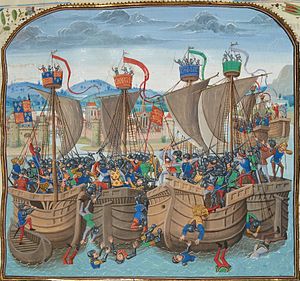Our website is made possible by displaying online advertisements to our visitors.
Please consider supporting us by disabling your ad blocker.
Battle of Winchelsea
| Battle of Winchelsea | |||||||
|---|---|---|---|---|---|---|---|
| Part of the Hundred Years' War | |||||||
 A depiction of medieval naval combat from Jean Froissart's Chronicles, 14th century | |||||||
| |||||||
| Belligerents | |||||||
| Kingdom of England | Crown of Castile | ||||||
| Commanders and leaders | |||||||
|
King Edward III Edward the Black Prince | Charles de la Cerda | ||||||
| Strength | |||||||
| 50 ships | 47 ships | ||||||
| Casualties and losses | |||||||
|
At least 2 ships lost Heavy human losses | 14–26 ships captured | ||||||
The Battle of Winchelsea or the Battle of Les Espagnols sur Mer ("the Spaniards on the Sea") was a naval battle that took place on 29 August 1350 as part of the Hundred Years' War between England and France. It was a victory for an English fleet of 50 ships, commanded by King Edward III, over a Castilian fleet of 47 larger vessels, commanded by Charles de la Cerda. Between 14 and 26 Castilian ships were captured, and several were sunk. Only two English vessels are known to have been sunk, but there was a significant loss of life.
England's trade, its war finance and its ability to bring force to bear against France were heavily reliant on seaborne transportation, especially to its territory in Gascony. With their own ability to raise and support a fleet much reduced by English activities, the French hired Castilian ships to blockade English ports. Frustrated by their effectiveness, Edward III led the fleet that intercepted them and inflicted heavy losses. In spite of that success, English trade and ports saw little relief from naval harassment by the French and their allies.
Previous Page Next Page


